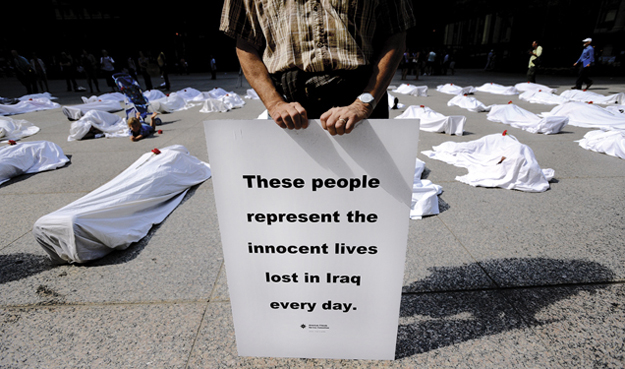‘Die-In’ protests Iraqi civilian casualties
September 28, 2008
While business suit-clad employees carried on their daily routines passing through the buildings surrounding Federal Plaza, at the corner of West Adams and South Dearborn streets, around noon on Sept. 22, more than 50 Chicagoans staged their deaths by lying on the pavement and covering their bodies with white sheets topped off with a single red carnation.
Soon, various commuters and a grade school class taking a tour of the plaza gathered to see and hear the spectacle. The names of 100 Iraqi civilians were melodically chanted by megaphone over the motionless bodies, reminiscent of a solemn memorial service.
As 77-year-old Oak Park, Ill., resident Virginia Castello distributed the carnations, she wove in and out of the diverse blend of participants, such as an elderly woman lying at the foot of her walker and a young mother lying at the foot of her daughter’s stroller.
“We’re here to remind everyone to not only think of what the war is doing to our servicepeople, but the Iraqi people,” Castello said.
It was the third year American Friends Service Committee and Peace Pledge Chicago staged the International Day of Peace ceremony to commemorate Iraqi civilian casualties. But, this year, had a lower turnout, said Michael McConnell, the director of the event.
The rising death toll of civilians caught in the middle of the war in Iraq rarely gets reported to the American people, McConnell said, much like the toll of Vietnamese civilians during the Vietnam War.
“There is a sense of war that is like a video game where many are apathetic about the victims,” he said. “There is a level of disinterest here … we’ve become immune to it.”
The death toll varies among organizations that track civilian deaths in Iraq. While the Iraq Body Count estimates 87,544-95,543 casualties since 2003, the World Health Organization and Opinion Research Business reports as many as 223,000 and 1,120,000 casualties, respectively.
American Friends Service Committee, a Quaker organization committed to non-violence, cites the Iraq Body Count’s toll, McConnell said. Iraq Body Count, which has been recording violent civilian deaths since 2003, draws its toll from crosschecked media reports and is supplemented by review and integration of hospital, morgue and non-governmental organization figures associated with the United Nations, according to IraqBodyCount.org.
McConnell also cited a UCLA study, released on Sept. 18, that found that while it seems last year’s U.S. troop surge-which sent more than 21,000 American troops to Iraq in January 2007-was successful, ethnic cleansing by rival Shiites and the fleeing of Iraq civilians out of their country may be responsible for the United States government assertion that violence in Iraq has decreased.
“There is this myth about the surge working, so people think it is better in Iraq. But 318 civilians have been killed in the first 21 days of [September],” McConnell said. “Would we tolerate that in this country if that level of violence was happening?”
McConnell said many participants in the “Die-In” at Federal Plaza tell him it is more of a spiritual experience lying in a public place, listening to the names of victims and their ages being sung out.
Mary Lou-Wade, a part-time oral expression instructor in Columbia’s English Department, said she came down to Federal Plaza after her morning class.
“It was a very moving experience to lie there and hear all those names; I could identify with individuals rather than numbers,” Lou-Wade said. “As a mother and a grandmother, when they would say ages, I would think of my own family.”
Aaron Dellutri, a 35-year-old computer technician, said he took the day off from work to participate in the somber event.
“It’s a gentle reminder that there is all this slaughter going on,” Dellutri said. “Not too many people talk about how many Iraqis have died or been displaced; I think this is a chance to humanize the faceless numbers of civilians.”
While the International Day of Peace “Die-In” focuses on commemorating Iraqi civilians, the American Friends Service Committee holds separate ceremonies to remember American troop casualties from the war in Iraq. The annual Eyes Wide Open display-which originally took place at Federal Plaza in Chicago in January 2004-tours across the country displaying thousands of lined-up combat boots.








